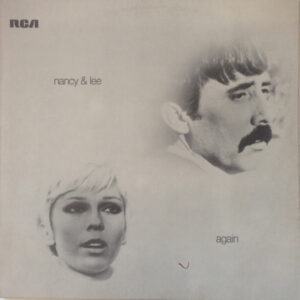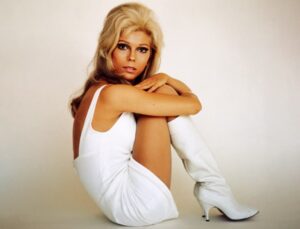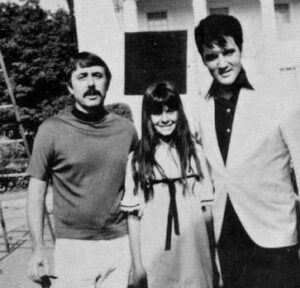I’m not sure what to write here. I don’t want to wax lyrical and go on forever as I am hungover and I assume people know the basics of Nancy (probably) and Lee (maybe). So forgive me if these comments are bittier than usual but …
I was looking forward to this album and have rushed it through the pile of records to the turntable. This is the only Nancy & Lee album I don’t have (there were three). It is also the only Nancy album per se I don’t have and it is one of a handful of Lee Hazlewood albums I don’t have. So, obviously, the enthusiasm levels to listen to this were pretty high.
Do we need a background on these two?
Nancy Sinatra – The daughter of Frank Sinatra, born in 1940, became an uber babe, had a handful of hits in the 60s including the immortal “These Boots are Made for walking”, co-starred in movies with Elvis and Peter Fonda and then faded from public view.
Lee Hazlewood – A maverick music wunderkind … country music by birth (1929 Oklahoma) and background though happy to mix country with folk, pop, baroque, lounge, exotica, psychedlica, poetry and anything else that takes his fancy. The man was bona fide genius but a genius from left field as he really did march to the beat of a different drum. He moved to Sweden in the early 70s and continued releasing albums before dying in 2007.
See bio links below for more detail on Nancy and Lee.
No, they weren’t married and didn’t go out.
Lee is, musically, more important to this story being the driving force behind the duo (he writes, arranges, sings and produces). Lee’s voice is pure country which is a mix of gravel and cigarettes. Importantly though, he knew what he was looking for musically, as twisted as it may be. Without Lee, Nancy would have been a stunning looking but pleasant pop singer as her solo Lee-less records show. With Lee she became a stunning looking pop singer who transcended music and became an icon well worthy of a “Greatest Hits” album (so many bands put out greatest hits albums though few bands are worthy of them). Nancy’s voice, which admittedly doesn’t have the widest range, is compensated for in tone and expression. Her voice is sexually ethereal (visually she is stunning, but her voice alone can make your peg move). Lee tapped into Nancy’s vocal sexuality (and persona) and her voice became expressive and suggestive which was the perfect counterbalance for his everyman country ruminations. Maybe he was trying to cover various markets, but in Nancy he found the perfect vocal companion and then they both transcended the material to create great country baroque pop mini melodramas.
It’s hard trying to pigeonhole this music (I love pigeonholing) but at best it is all those things I have said above, (country pop, baroque pop, country, pop, lounge) but it probably also falls into “exotica” and what record nerds have called “obscuro”.
Allmusic:
Exotica is a form of easy-listening lounge music that draws upon world music, but it doesn’t aim for authentic replication. Instead, exotica’s primary concern is lightweight entertainment, gathering readily identifiable ethnic sounds into a smooth, easily digested pop form. The music typically conjures up images of exotic foreign tourist destinations geared toward white Americans, and in that sense, it’s sort of the equivalent of a pre-packaged resort vacation — fun, inauthentic, and safely familiar. Exotica is usually arranged for standard orchestras, with instrumentation added according to the location being evoked (ethnic percussion, string instruments, etc.); some exotica also borrows the weird, otherworldly sound effects that define the space-age pop style. Even in its ’50s/early-’60s heyday, exotica was often derided as cheesy and contrived, but its ’90s revival among alternative music fans embraced those very qualities (albeit ironically), and also brought a sincere reassessment of the music’s inventive production techniques.
Obscuro is a nebulous category that encompasses the weird, the puzzling, the ill-conceived, the unclassifiable, the musical territory you never dreamed existed. Or, to put it another way, it’s the kind of music that devoted record geeks play for one another, with the announcement “you have to hear this.” Obscuro records might be novelties good only for a laugh or two; they might be so utterly bizarre that you can’t quite process them no matter how often you’ve heard them; they might be failed experiments in commercially accepted styles, or wildly uncommercial; or, they might just be extremely rare records that have become legendary among collectors in part because very few people have heard them. Though it can come from virtually anywhere, obscuro tends to be concentrated in areas that either tried to push the boundaries of studio technology, or that experimented with offbeat instrumentation or stylistic fusions.
I have never liked the term “obscuro” as I find most “obscuro” tends to be either “lounge” or “exotica” and the term suggest that the music is “obscuro” in commerciality which it may have been but it was intended for the mainstream. The more experimental “obscuro” albums I tend to identify as either avant-garde lounge or avant-garde exotica.
Okay, okay there is a lot of splitting hairs here but I get some comfort in applying a mutated Platonian Theory of Forms in relation to music. Why? Cause it answers the question “what is that”?
To suggest that categorising, labelling or pigeonholing music somehow stifles the musician is banal. To suggest labels are useless is worse … life is to short to listen to everything and labels are shortcuts to what you like. So accurate labelling gets you to the sound you like. Your appreciation of the individual act then is up to you.
End of soapbox statement #1.
So, the music of Nancy and Lee is mainstream though out there because of the slightly twisted personalities involved (specifically Lee). I always found people like Lee more interesting than those who set out to be twisted and avant guard .For me the mainstream artists who are slightly off kilter tend to put out more interesting and experimental music as they have more room to move (and usually draw from more influences) where as avant guard artist seeks avant guard for its own sake and usually remains within it’s formal musical boundaries and becomes less experimental or at the very least, less interesting.
It’s not accident that the most innovative music acts of the 20th century – Elvis, Frank Sinatra, Bob Dylan, The Beatles and The Beach Boys – were all mainstream musicians and had their tastes rooted in the mainstream.
Lee’s solo material is fascinatingly idiosyncratic though admittedly not as easily accessible as this. Likewise, part of that accessibility is due to Nancy and her willingness to listen to Lee. His album with Ann-Margaret is fascinating but flawed (I haven’t heard the albums he did with Swede vocalists). Likewise, Nancy did an album with country singer Mel Tillis that is quite listenable but nowhere near as interesting as the Lee collaborations.
This album is all those things I have discussed above and almost plays like a concept album. Again Lee wrote most of the tracks, arranged and produced the album so it his vision. Nancy though, as always, fits in perfectly.
Tracks (best in italics)
- Arkansas Coal – amazing MOR “suite” about a Arkansas coal miner and his woman …. with Lee doing the voice of the miner and Nancy doing the wife and the daughter. Politics excepted, this covers the same territory as many, many folk songs on coal mining.
- Big Red Balloon – about a man who leaves his wife … in a big red balloon.
and they don’t belong together
And then one day one of them tries to leave
and does but in a most peculiar way
- Friendship Train – A big ballad much in the style of their 1968 hit album and music we know.
- Paris Summer – another up-tempo ballad that recalls “Some Velvet Morning” … with the lyric “Paris Summer” replacing “Phaedra” from the other song. Still its totally dreamlike in a depiction of a Paris of lovers.
- Congratulations – (not written by Hazlewood) this is an biting song anti-war song (it’s 1972 don’t forget and the war was dragging on) … the musical MOR disguises it’s potency and the lyric sometimes pulls at the obvious heartstrings but it’s still convincing.
- Down From Dover – a Dolly Parton song that could pass for a Lee Hazlewood song with Lee singing in his lowest possible register.
- Did You Ever – the #2 hit in the UK and an unlikely hit but, then again, dancing frogs, singing rats and assorted wombles have had hits there. If nothing else the English love a novelty tune. Written by country singer songwriter Bobby Braddock (and recorded by Charlie Louvin and Melba Montgomery in 1971 – I don’t know whose version was done first as the Nancy & Lee single version was released in mid 1971) this song harkens back to the jokey light hearted call and response songs Nancy did with her father (“Something Stupid”) and Dean Martin (“Things”) though as befits 1972 the song is laden with innuendo. Rodriguez didn’t dodge the question in his similar themed “I Wonder”
- Tippy Toes – This is outta left field … a song about little baby girl on tippy toes.
is discovering you can make little people
And little girl people are something extra special to their daddies
And so on Sunday morning when you’re trying to sleep late
and because she loves you very much
she walks around the house on her tippy toes wearing your boots
- Back On The Road – similar to Roger Miller’s “King of the Road” … and there’s nothing wrong with that.
- Got It Together – This song is a total cack and a wonderful way to the end the album though not something you can listen to often. It’s Nancy & Lee unplugged and in format it recalls some of the Sonny & Cher ad-libbed monologues set to music. Lots of personal in-jokes and veiled topical references; guitar picker Jerry Reed was running hot in the charts, Vietnam was ongoing, Hazlewood had moved to Sweden in the late 60s. And yes … Nancy’s speaking voice is enough to make the loins stir.
And …
This album is their second of three collaborations (the first was Nancy & Lee from 1968 and the third was from 2004). And, conveniently, this album is the second best of the collaborations with the first as the best. The first had all the hits: “Summer Wine,” “Sand,” , “Jackson,” and “Some Velvet Morning”. The last was extremely underrated but possibly lies a shade under this LP… and this album is just below the first.
A thoroughly entertaining album … I’m keeping it … and playing it at the next dinner party.
So much for keeping this comment short and simple.
Chart Action
In England the single “Did You Ever” went to #2 ( and the album was re-titled to that for the LP release and it went to #31)
Sounds
Arkansas Coal
http://www.youtube.com/watch?v=PzCm70yTWvk
live
http://www.youtube.com/watch?v=-0ITIYnBWhY
Big Red Balloon
http://www.youtube.com/watch?v=AG8gcUfKrug&feature=related
http://www.youtube.com/watch?v=rh1HacSZgZI&feature=related
http://www.youtube.com/watch?v=jOuTUcaf_oM
http://www.youtube.com/watch?v=NwmNCf5f-Sc&feature=related
http://www.youtube.com/watch?v=sd9Kvq_jx-U&feature=related
http://www.youtube.com/watch?v=c-828Lmx7tM&feature=related
http://www.youtube.com/watch?v=2_xza4eseV0&feature=related
Bio
Website
Pictures
(originally posted: 14/02/2010)



